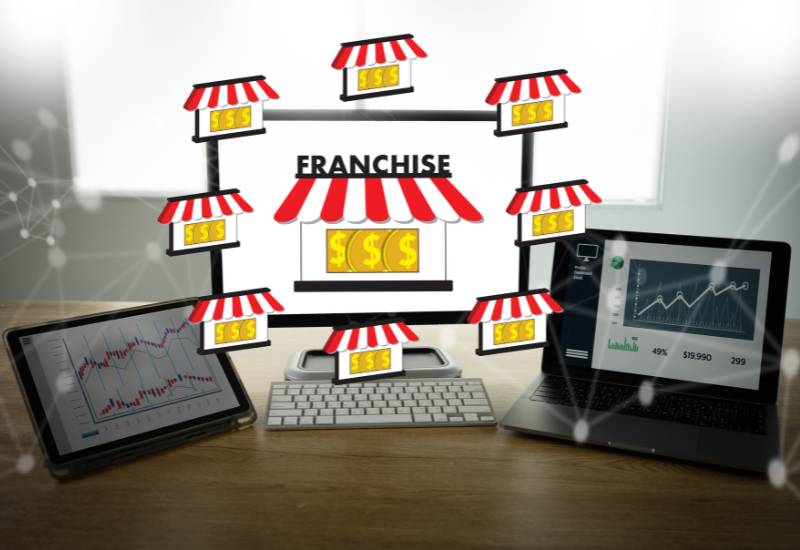What Exactly is the definition of a business that is a Franchise?
Steffan Addison
. 3 min read
A business that is owned by an entrepreneur or a group of entrepreneurs and that sells a product or service that is branded by a corporation and for which the corporation provides assistance in every aspect of the business in exchange for a combination of a flat fee and fees based on profits or sales is referred to as a franchise business. Nowadays, with the advancement of technology, many franchise businesses have incorporated online chat platforms to provide instant assistance and support to their franchisees. In other words, a franchise is a type of license that allows the holder of the license to sell a product or service under the business name of the franchisor.

The Following are Some Examples of Franchises
- An agreement between the manufacturer and the retailer, similar to the one that exists between automakers and their retailers. The franchiser provides the retailer (also known as a dealership) with motor vehicles.
- A relationship between a manufacturer and a wholesaler, which is typical of companies that produce soft drinks. The franchisor provides the franchisee with a license that allows the franchisee to produce and sell the franchisor's product.
- An arrangement in which the franchisor, who acts as a wholesaler, sells products to the franchisee, who acts as a retailer, and the franchisee then sells those products to the general public.
- An agreement between two or more retailers; this is the "classic" business format for a franchise. A product or service is marketed by the franchisor through a chain of independently owned.
Franchisee Benefits
- When compared to the costs of starting a company from scratch, the costs of opening a franchise can be significantly lower.
- The company already possesses immediate brand recognition, a supply system that has been ready-built from the ground up, and a marketing campaign that has been professionally implemented.
- Instead of starting from scratch, franchisees take on the business practices that are already established by their franchisors.
- The franchisor is committed to the prosperity of its franchisees and will play an active role in providing guidance in this regard.
Disadvantages
- It is possible for individual franchisees to tarnish the reputation of the franchisor by providing poor customer service or substandard product quality.
- The franchisors place a variety of restrictions on the franchisees, and the franchisees are required to adhere to the business plan.
- The franchisor of a business format franchise provides the franchisee with not only the trade name, products, and services associated with the franchisor's company, but also an entire system for running the business.
Who is the Owner of the Company?
It is not necessary for a company to be considered a franchise simply because it has multiple locations. If all of the locations are owned by the same person, then the company does not qualify as a franchise according to the standard definition. The organizational make-up of the ownership of a business is what distinguishes it as a franchise. The process of franchising takes place when the owner of a company grants a license to one or more parties.
Why do some businesses choose to operate through the franchise model?
The expansion of a company's reach through the use of franchises is one of the many potential benefits of franchising. Isaak Singer pioneered the concept of franchising when he began selling sewing machines under the brand name Singer, and Henry Ford did the same thing in the automobile industry. Nevertheless, franchising a business presents companies with a significant opportunity benefit, which is that they do not have to spend all of their own money on expanding their operations.
Regulations Regarding Franchises
The franchise disclosure document, also known as the FDD, is the document that serves as the legal basis for the sale of a franchise. It is a requirement that is fundamental to the franchising laws at both the federal and state levels. In order to comply with the FDD, franchisors are required to file all franchise disclosure documents with the state regulators in their jurisdiction. Additionally, in accordance with Section 8 of the Small Business Franchise Act, franchisors have the ability to renew their agreements with their franchisees when those agreements come to an end as outlined in the FDD.
Conclusion
In conclusion, a franchise business is a popular business model that involves an entrepreneur or group of entrepreneurs owning a business that sells a product or service branded by a corporation. The franchisor provides assistance in every aspect of the business in exchange for a combination of a flat fee and fees based on profits or sales. Regulations regarding franchises require franchisors to comply with the franchise disclosure document, file documents with state regulators, and renew agreements with franchisees. Overall, franchising offers both benefits and disadvantages, but is a popular and successful business model for many companies.
More Stories from
Importance of Franchisee Training Programs for Franchise Success
The article discusses the importance of franchisee training programs for franchisors to fulfill their responsibilities towards franchisees and achieve success in the franchise system.
What You Need to Include in Your Marketing Plan for the Next 5 Years?
This article discusses the importance of having a strategic marketing plan for businesses. It covers the benefits of creating a marketing plan.
Unlocking Business Growth: Harness the Power of Web Solutions
Embrace the power of the internet to unlock your business's true potential and propel it towards unprecedented growth.
Embracing the Remote Work Revolution: Pros and Cons for Businesses and Employees
This article explores the significant growth of remote work over the past decade, driven by technological advancements and changing work cultures.
A Comprehensive Guide to Performance Testing: Stages, Metrics, and Tools
It explores the importance of performance testing in the development lifecycle, the types of performance testing, and the metrics used to measure performance.






.png?width=40&aspect_ratio=1:1)



.png?width=40&aspect_ratio=1:1)
